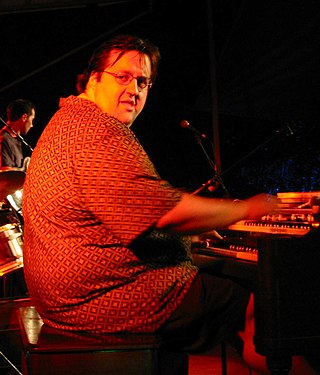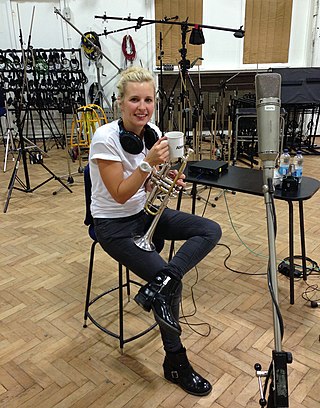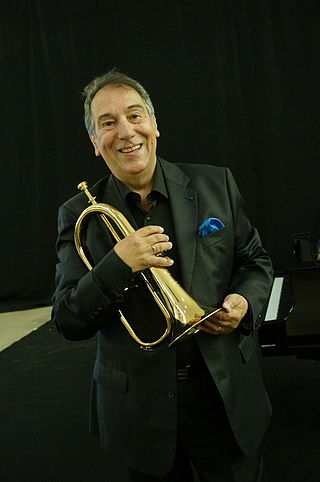Related Research Articles

Geist und Seele wird verwirret, BWV 35, is a church cantata by Johann Sebastian Bach. He composed the solo cantata for alto voice in Leipzig for the twelfth Sunday after Trinity and first performed it on 8 September 1726.

Herbert Norman Howells was an English composer, organist, and teacher, most famous for his large output of Anglican church music.

Trevor David Pinnock is a British harpsichordist and conductor.

Wir danken dir, Gott, wir danken dir, BWV 29, is a sacred cantata by Johann Sebastian Bach. He composed it in Leipzig in 1731 for Ratswechsel, the annual inauguration of a new town council, and first performed it on 27 August of that year. The cantata was part of a festive service in the Nikolaikirche. The cantata text by an unknown author includes in movement 2 the beginning of Psalm 75, and as the closing chorale the fifth stanza of Johann Gramann's "Nun lob, mein Seel, den Herren". Bach scored the work in eight movements for four vocal parts and a festive Baroque orchestra of three trumpets, timpani, two oboes, strings, an obbligato organ and basso continuo. The organ dominates the first movement Sinfonia which Bach derived from a Partita for violin. The full orchestra accompanies the first choral movement and plays with the voices in the closing chorale, while a sequence of three arias alternating with two recitatives is scored intimately.

The Polyphonic Spree is an American choral rock band from Dallas, Texas that was formed in 2000 by singer/songwriter Tim DeLaughter. The band's pop and rock songs are augmented by a large vocal choir, and instruments such as flute, trumpet, french horn, trombone, violin, viola, cello, percussion, piano, guitars, bass, drums, electronic keyboards, and EWI.

Helmuth Rilling is a German choral conductor and an academic teacher. He is the founder of the Gächinger Kantorei (1954), the Bach-Collegium Stuttgart (1965), the Oregon Bach Festival (1970), the Internationale Bachakademie Stuttgart (1981) and other Bach Academies worldwide, as well as the "Festival Ensemble Stuttgart" (2001) and the "Junges Stuttgarter Bach Ensemble" (2011). He taught choral conducting at the Frankfurt Musikhochschule from 1965 to 1989 and led the Frankfurter Kantorei from 1969 to 1982.

Nicolas de Grigny was a French organist and composer. He died young and left behind a single collection of organ music, and an Ouverture for harpsichord.

Gustav Maria Leonhardt was a Dutch keyboardist, conductor, musicologist, teacher and editor. He was a leading figure in the historically informed performance movement to perform music on period instruments.

Joey DeFrancesco was an American jazz organist, trumpeter, saxophonist, and occasional singer. He released more than 30 albums under his own name, and recorded extensively as a sideman with such leading jazz performers as trumpeter Miles Davis, saxophonist Houston Person, and guitarist John McLaughlin.
Joan Lippincott is an American concert organist and former head of the organ department at Westminster Choir College in Princeton, New Jersey.

Alison Louise Balsom, Lady Mendes, is an English trumpet soloist, arranger, producer, and music educator. Balsom was awarded Artist of the Year at the 2013 Gramophone Awards and has won three Classic BRIT Awards and three German Echo Awards, and was a soloist at the BBC Last Night of the Proms in 2009. She was the artistic director of the 2019 Cheltenham Music Festival.

William Ifor Jones was a Welsh conductor and organist. Born into a large coal-mining family and raised in Merthyr Tydfil, Jones studied at the Royal Academy of Music as a scholarship student in London from 1920 to 1925. He studied the organ with Sir Stanley Marchant at St. Paul's Cathedral, London; orchestral conducting with Ernest Read and with Sir Henry Wood, ; and harmony with Benjamin Dale. He was for a time organist at the Welsh Baptist Church in Castle Street, London, worked at the Royal Opera House, as a vocal coach at Covent Garden, assisted with the British National Opera Company in the role of prompter, and was the Assistant Choir Master at St. Paul's Cathedral, London.
Igor Kipnis was a German-born American harpsichordist, pianist and conductor.

Johann Sebastian Bach was a German composer and musician of the late Baroque period. He is known for his orchestral music such as the Brandenburg Concertos; instrumental compositions such as the Cello Suites; keyboard works such as the Goldberg Variations and The Well-Tempered Clavier; organ works such as the Schubler Chorales and the Toccata and Fugue in D minor; and vocal music such as the St Matthew Passion and the Mass in B minor. Since the 19th-century Bach revival he has been generally regarded as one of the greatest composers in the history of Western music.

Guy Touvron is a French classical trumpet player and music teacher. He is an accomplished soloist, having played with some of Europe's leading orchestras, and has premiered several prominent trumpet concertos. Touvron has given over 3,000 concerts, features on over 70 recordings, and has won several prizes, including three international Grands Prix.
Musical instruments used in Baroque music were partly used already before, partly are still in use today, but with no technology. The movement to perform music in a historically informed way, trying to recreate the sound of the period, led to the use of historic instruments of the period and to the reconstruction of instruments.
Patrick Russill is an English choral conductor, organist and music conservatoire teacher.
Scott Dettra is an American concert organist and church musician. He tours in North America and Europe, and is former Director of Music and Organist at the Church of the Incarnation in Dallas, Texas. He is also Organist of The Crossing, a professional chamber choir based in Philadelphia. From 2007 to 2012, he was Organist of Washington National Cathedral.
Pascal Vigneron is a French classical musician, both trumpeter, organist, and conductor.
Jörg Halubek is a German conductor, harpsichordist, organist and professor.
References
- ↑ "Archived copy". Archived from the original on 18 September 2017. Retrieved 29 August 2020.
{{cite web}}: CS1 maint: archived copy as title (link) - ↑ "Arizona Bach Festival". Archived from the original on 8 August 2013. Retrieved 23 August 2013.
- ↑ "Connecticut Early Music Festival | Early Music America". Archived from the original on 23 August 2013. Retrieved 23 August 2013.
- ↑ "2009_04". Archived from the original on 8 April 2012. Retrieved 23 August 2013.
- ↑ Whatley, Guy (2006). Toward a Performance Practice for Tudor Organ Music (Ph.D.). Arizona State University.
- ↑ "Statement on Plagiarism | March 16, 2021". www.voxhumanajournal.com. Retrieved 18 March 2021.
- ↑ "Trumpet and Cornet Recordings". Hickman Music Editions. Retrieved 23 December 2012.
- ↑ "Eternal Source of Light Divine by Jean-Christophe Dobrzelewski & Guy Whatley". Music.apple.com. Retrieved 11 August 2020.